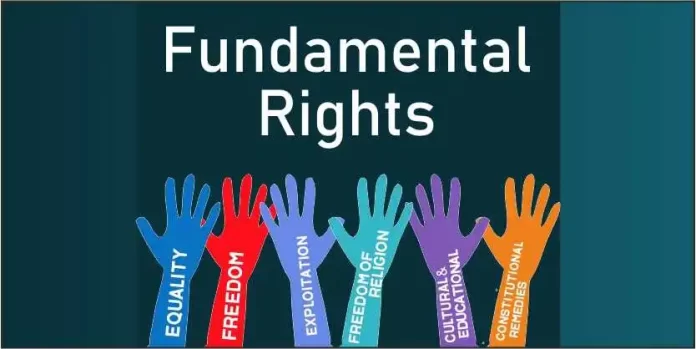The Constitution of India is made to protect the rights of every individual residing in the country. The Constitution of India is the Supreme Law of the country which clearly defines the duties, principles and Fundamental Rights of the government.
Since its draft in 1947, it has figured out several amendments. The existing two fundamentals of the constitution raise questions of how they differ between them. Are both of them legally enforceable? How are both of them necessary?
What are Fundamental rights?
Fundamental refers to something that is required for something else to operate, as the name would imply. Therefore, fundamental rights are fundamental human rights that it entitled all Indian citizens to, regardless of their location of birth, religion, or gender. Fundamental rights are available for Indian citizens irrespective of place, gender, caste, or religion.
Part III of the Indian Constitution from Article 14 to Article 35, there is a provision to guarantee and protect fundamental rights.
Let’s have a look at Fundamental rights:
- Right to Equality
- Right to Freedom
- Right against Exploitation
- Right to Freedom of Religion
- Culture and Educational Rights
- Right to Constitutional Remedies
1-Right to Equality (Articles 14-18)
Article 14-Equality before the law
According to this article, everyone is treated fairly and equally in the eyes of the law. Additionally, it declares that everyone is given equal protection under the law. This implies that people will be treated equally in situations that are similar.
Article 15 – Prohibition from Discrimination
All forms of discrimination are forbidden by this article. No one may be subjected to discrimination on the grounds of their birthplace, caste, race, or religion. The remainder of this article is broken into 4 parts:
Article 15 (1) – According to this article, the state is not allowed to discriminate against anyone.
Article 15(2)- No individual shall be denied entry to any public location, such as a train station, or the use of any public facility, such as a well, a road, etc.
Article 15(3)- The State shall make specific provisions for women and children.
Article 15(4)-A weaker segment of society, such as a scheduled caste or tribe, or another weaker segment that has been recognized by the government, may be given particular consideration under
Article 16: Issues pertaining to public employment and equality of opportunity
The purpose of this article is to give citizens equal opportunity to work for the State.
Five sections make up the remainder of this article:
Article 16 (1)-All people shall be afforded equal opportunity in areas of employment.
Article 16 (2) – According to this Article, discrimination is not permitted in any aspect of State-provided work.
Article 16 (3) – This provision enables the legislature to enact laws requiring residency requirements for positions in the public sector.
Article 16(4)-In terms of issues pertaining to public employment, Article 16(4) enables the parliament to create specific measures for society’s weaker groups.
Article 16(5) – This Article enables the parliament to pass legislation mandating the appointment of members of a certain faith to positions within that religion’s institutions.
Article 17- It prohibits the practice of untouchability, and considers it as a punishable offense.
2-Right to Freedom (Artilce 19-22)
With Article 19 of the constitution, a citizen of India has the freedom of
- Speech and expression
- Forming unions
- Movement throughout the India
- Living in any part of India
- Business, trade and profession
Article 20 of the constitution with its 3 sub-clauses protects individuals accused of crimes.
Article 20(1)- No can be punished for non-punishable acts during when committed.
Article 20(2)-Anyone can be punished more than one time for a single offense.
Article 20(3)-An accused of a crime can’t be compelled to be a witness against himself
Article 21 gives every individual the right to personal liberty and no one can be deprived of this right.
Article 22 gives right to individual the protection of being arrested in certain conditions.
3-Right Against Exploitation (Articles 23-24)
Article 23 prohibits human trafficking and other kinds of forced labor.
Article 24 prohibits children below the age of 14 years from being employed in hazardous places like mines or factories.
4-Right to freedom of religion (Articles 25-28)
Article 25 gives freedom of religion to every citizen of the country.
With Article 26, you get the freedom to manage religious affairs.
Article 27 gives freedom as to payment of taxes to promote any particular religion.
Article 28 gives freedom to attend religious instruction, or religious worship in certain educational institutions.
5-Cultural and Educational Rights (Articles 29-30)
Article 29 gives right to the community of people to protect or conserve their culture, heritage, and language.
With Article 30, religious minorities get the right to establish educational institutions
6-Right to Constitutional Remedies (Article 32)
Article 32 of the constitution guarantees to provide remedies in the condition it violated the fundamental rights of citizens.
Previously Right to Property used to be a fundamental right, but currently, it is considered as legal right under Article 300A.
Frequently Asked questions (FAQs)
Are fundamental rights qualified or absolute?
Fundamental rights are not absolute, but qualified
How fundamental rights differ from fundamental duties?
Fundamental duties are moral obligations of citizens towards country, and they are not justiciable. However, basic rights given to the citizens of country which are justifiable are called fundamental rights.
Is it crime to violate fundamental rights?
If any law infringes on Fundamental rights, the provision of the fundamental rights act considers it illegal or unconstitutional.


